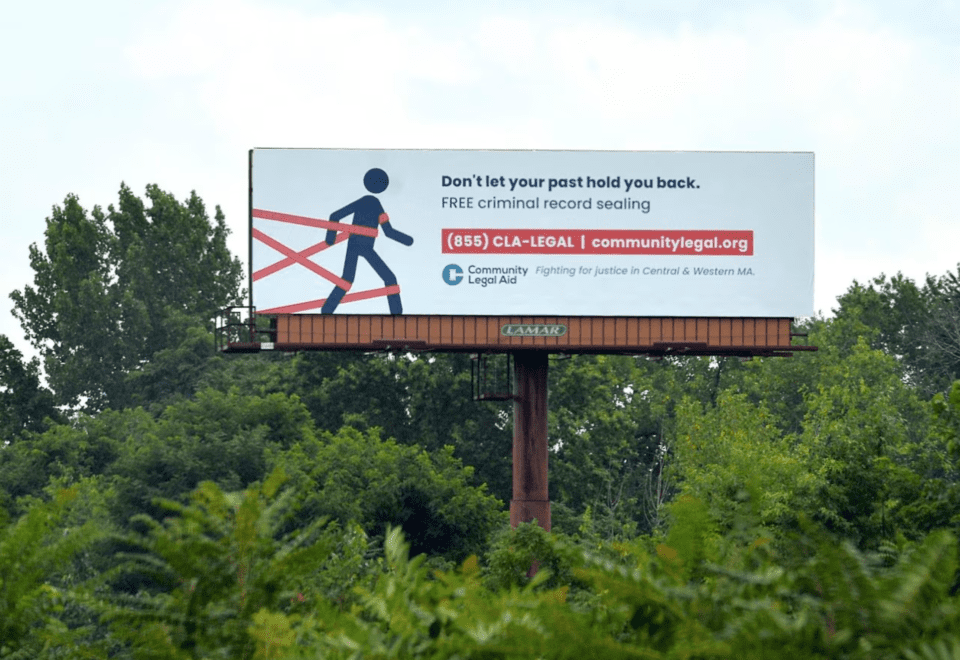
August 18, 2023
Community Legal Aid raises awareness about ways people can overcome their criminal records
BY MassLive
SPRINGFIELD — Last year, the Community Legal Aid program helped over 200 people expunge and seal their criminal records. This year, the group hopes to help many more.
Senior Supervising Attorney Alyssa Golden said criminal records create barriers that make it hard to move on after a case is resolved.
“We assist people with a wide range of civil consequences” as a result of such records, Golden said. “We represent those denied public housing subsidies, employment or termination because of criminal records.”
Last week, the nonprofit program launched a three-month advertising campaign to raise awareness about how it can help people overcome past mistakes. Funding from the state helped to support the outreach. The nonprofit serves low-income and elderly residents of Berkshire, Franklin, Hampden, Hampshire and Worcester counties.
Billboards were placed in Worcester and along Interstate 91 south and West Columbus Avenue in downtown Springfield. The outreach seeks to alert people that there are ways to break free of criminal records, a process known as expungement. “Don’t let your past hold you back,” the message reads.
Additionally, ads equipped with QR codes that bring people right to an application page will be on public transportation in all five counties of central and western Massachusetts.
“Many people do not know that their criminal record may be eligible for sealing after a period of time with no new convictions,” said Golden.
How system works
According to Golden, certain employers with access to the Criminal Offender Record Information system are able to see cases that has been dismissed, especially jobs working with vulnerable populations like children, adults with disabilities and the elderly.
Petitions to seal or expunge records carry no cost. Obtaining a copy of a CORI report costs $25.
“People with low income can ask for a waiver. Most people that we work with, because we have an income cap, are eligible,” Golden said.
People can submit a CORI waiver and a petition to seal or expunge records on their own behalf by finding the forms online at Mass.gov. They can get help filing by calling Community Legal Aid at 1-855-252-5342.
Sealing records prevents employers from seeing the records in a CORI check. Expungement is the complete destruction of the case file.
According to Golden, a common assumption is that dismissals of criminal cases are automatically sealed.
“It’s not true,” Golden said. “People have to seek to seal dismissed charges.”
Another common misconception is associated with the time frame of sealing and expunging records.
Examples of crimes
Records eligible for expungement include many marijuana-related offenses, offenses that are no longer a crime in Massachusetts and convictions that were vacated and dismissed due to the Massachusetts drug lab scandals, she said.
People have the right to get a simple possession and other marijuana-related offenses expunged depending on the amount involved, she said. “Let’s say you had a simple possession with intent to distribute, the court may go back and look to see if the amount is now within the legal limits,” she said.
There is also a difference in the process to petition for record sealing and expungement.
“Sealing records are more widely available, expungement is specific,” Golden told The Republican and MassLive.
A record can be sealed by a petition submitted to the office of probation. “If it is a non-conviction (charges that were dismissed) that [is] older, you can file a petition in court that handled the criminal case, and a judge will decide,” she said.
If the petition is denied by the judge, Golden said, a reconsideration or a new petition can be filed to seal the record in the future.
“Judges are more likely to deny sealing a record if the non-conviction is recent,” Golden said. “The judge will consider all aspects, time and what barriers or anticipated barriers a person may be facing in housing or employment because of the charge.”
Golden described the process of expunging records.
“With expungement, a petition with the court that the case was handled in can be filed. Most cases are discretionary. There will be a hearing in front of the judge where you would explain the impact of having a record and why the charge or conviction should have never been on your record in the first place,” Golden said.
This can be done in the case of marijuana, where it is no longer a crime, or a vacated conviction. That’s when there was fraud or a “material” mistake made by an expert witness, she said.
Golden said that when she was a public defender, she saw firsthand how the courts cycle people in and out of the system — and the impact criminal records have on basic survival.
“I believe it is incredibly important to have opportunities — and more than second, third and fourth chances,” she said. “People deserve more than that. I love to help people push away barriers so they are able to survive and thrive the way they would like.”
“The new campaign is a unique opportunity for us to try something new and creative to reach residents of Central and Western Massachusetts,” she said.
Golden said her group is growing. By September there will be seven staff members plus herself. “We’re expanding our capacity to do this kind of work. We are flexible and responsive to new and legal issues a head.”

















































